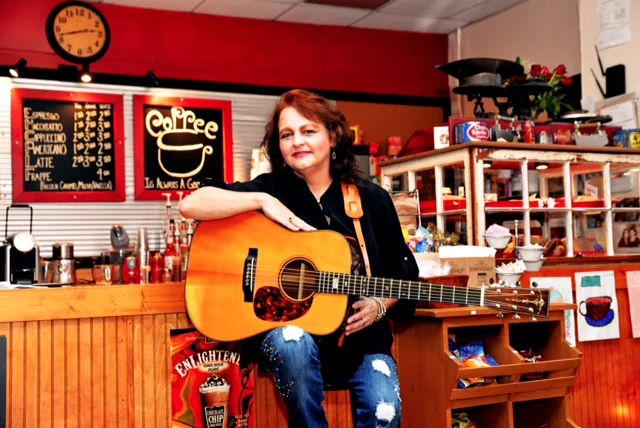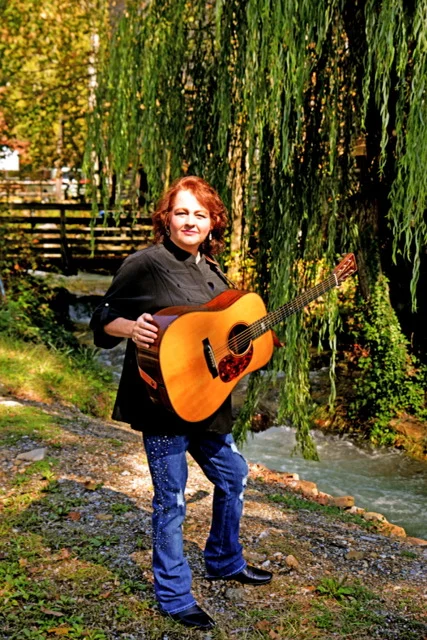Bluegrass legend Dale Ann Bradley never consciously made it her goal to stick to her roots. Her musical heritage is simply something so strongly rooted within her that her tastes, she feels, will forever be the fruit of her family tree.
Bradley grew up in eastern Kentucky, in a Primitive Baptist family, where the only music she’d hear for years would be the a cappella singing from the special Old School Hymnal. It’s a simple, yet beautiful way to make music, thought by the Primitive Baptists to be closer to what the Bible calls for. As a girl, Bradley found herself with a small, plywood guitar—she made the pick out of milk carton plastic—and began experimenting with instrumentation as well as writing her own songs. “I drove everyone crazy. The first thing I wrote about was clouds,” she remembers. “The songwriting was something I could kind of do in private, like a diary, kind of.” She’d always liked to read books and poetry, and to her, it felt like a similar form of expression.
“I’m not the world’s best spoken or literary person,” she says. “But writing songs is something I have the heart and spirit for.”
As a young teenager, Bradley met a friend in her community who exposed her to James Taylor and Jim Croce, and she credits that young man with taking her musicianship to another level. When she could get books from the library, she’d learn as much as she could about music theory—the idea of different cultures creating different musical standards still fascinates her to this day.
Bradley's family eventually adjusted to the idea that she would perform her own kind of music publicly, though it was technically not something their religion allowed. They compromised by monitoring where and when she played. She’s grateful for the direction. Looking back, she felt it probably kept her from “pitfalls” during her early adulthood. Soon enough, they became her biggest supporters.
Nothing doctored up
While she played in bluegrass bands when she could, Bradley found herself returning over and over to the simple, unadorned style she grew up with. “I don’t add a lot of instrumentation—it’s basic acoustic,” she explains. “I try to make it an honest depiction of me and what I do live. It’s a natural tone.”
She describes her music as “nothing doctored up,” but at the same time, she’s excited to see the rest of the bluegrass community experiment with technology and arrangement. “I just tend to like it my way, with a less occupied sound. But you can’t keep technology from coming into the industry, and who would want to?”
For Dale Ann, though, her music stems from a certain feeling. “I’ve never wanted to get rid of that feeling, and I don’t think I could if I wanted to. The mountain feeling—the experiences that you have in your culture.”
After taking a break to start a family, Bradley returned to the stage in 1989, having been asked to perform at the Renfro Valley Barn Dance, a venerable Kentucky live stage and radio program that’s been showcasing bluegrass and country music for more than 80 years. Soon a Renfro regular, she began helping out on its companion radio show, the Renfro Valley Sunday Morning Gatherin’. She joined the New Coon Creek Girls (a revival of the groundbreaking Appalachian string band from the 1930s) in Renfro and spent several years performing with the group. The momentum kept building.
“I’m not the world’s best spoken or literary person,” she says. “But writing songs is something I have the heart and spirit for.”
IWith her clear and soulful soprano and classic Appalachian-inspired songwriting, Dale Ann Bradley has been a coveted solo act now for 20 years. And the global bluegrass community has taken notice, dubbing her the International Bluegrass Music Association’s (IBMA) Female Vocalist of the Year five separate times. Greats like Pam Tillis, Vince Gill, and Alison Krauss have collaborated with Bradley, and 2016 brought her first Grammy® nomination for the album Pocket Full of Keys.
Sharing traditions with artists from other cultures
No matter how many awards and opportunities are heaped upon her, Dale Ann Bradley treasures the experience of roaming around the very festivals she’s been invited to play in, constantly keeping an ear out for a new sound, something she can learn to appreciate. The origins of music that have sprung from wells other than her own Appalachian one keep her interested and inspired to tell her region’s musical heritage, inspiring others in her turn.
She recounts an experience of hearing an Eastern European band at a festival in Maine within the last couple of years that stopped her in her tracks. Their unusual (to her) instruments and different chord structures reminded her that we all still have so much to learn about each other.
It hasn’t surprised Bradley, really, that bluegrass is often well received in Canada, Europe, or even Asia. Certainly, they may not know much about Appalachia, but, as she says, “Their experience is just like ours, in a way. It’s just happening in another place.” She attracts the type of music fans who are looking for artistic expressions of truth and beauty from other cultures—the kind we can all universally relate to. “They just want to hear that genuine approach.”
Dale Ann Bradley makes her Richmond Folk Festival debut in 2017.



